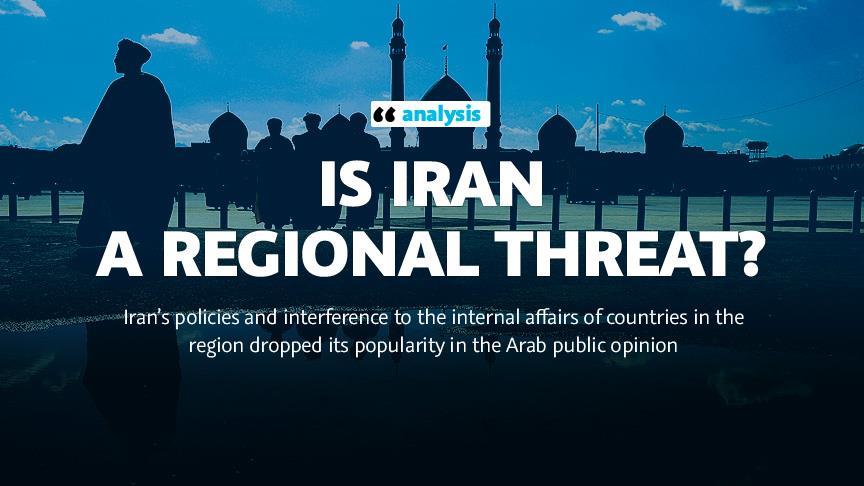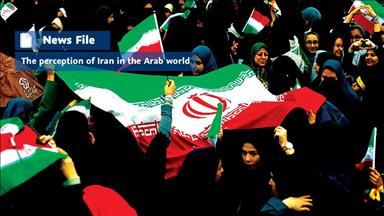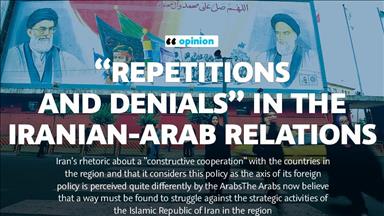ANALYSIS - Is Iran a regional threat?
Experts say Turkey can play an active role in creating balance of power in MIddle East

By Ihsan el-Fakih
ISTANBUL
A lot of Arab researchers argue that a consciousness was formed on the level of people that Iran was creating an “existential” threat by supporting the Allies and organizations but there was a big disagreement between some countries and people.
While experts are in consensus that there was no Arab and Arab-Islam project against Iran’s project of expansion in the region, some dwell on the fact that Turkey would play an active role in creating a balance of power in the region.
Research institutions on trends in Arab public opinion had prepared surveys in which 20,000 people participated. One of those was the Arab Center for Political Research’s survey, which was conducted in 2015, signaled, “Iran became a source of threat in the region”. 62 percent of the participants of this survey, which was conducted in 12 counties, said that they find Iran’s policies negative while 28 percent said they find it positively.
In another research conducted by Al Jazeera Research Center in 21 Arab countries with the title of “Iran in the balance of Arab intellectuals,” most of the participants were against Iran’s interference in Syria, Iraq and Yemen.
While 85 percent of the participants were against Iran’s interference in Syria, 89 percent were against interference in Yemen and 86 were against Iraq. 67 percent of respondents said Iran was a threat to Arab interests.
These results show that Iran’s policies and interference to the internal affairs of countries in the region dropped its popularity in the Arab public opinion.
Speaking to Anadolu Agency, Nebil el Atum a Jordanian expert on Iran said: “Iran has created a conflict zone as a result of its interventions by using sleeper cells in its own organizations or taking advantage of Shia minorities existence among the Sunni majority.”
“Iran’s image in the region was damaged after it was revealed that it was ignited the regional crisis by interfering in the internal affairs of countries in the region,” Atum said.
He added that although social media has created a general awareness about the danger of Iran’s project, governments were in a deliberate attitude towards not to explain the goals and objectives of the project.
Atum stated that rhetoric and ideas on “Ending the tension among the regional countries, establishing peace and stability on the basis of mutual respect and nuclear program was peaceful,” would not be realize if the system of Guardianship of the Islamic Jurist continue and Iran did not guarantee that it will not provoke sectarian tension.
Stating that there was not a common stance against Iranian threat among the Arab countries, Atum pointed out the need of developing an Arab project to prevent Iran from threatening people and countries in the region.
Nasir el-Feddale, a former lawmaker in Bahrain and the head of the El-Minber National Islamic Association, agrees the idea that people in the region began to understand the danger of “Iran’s expansionist Persian Empire project. El Feddale said that Iran was trying to attract Shi’ites to be able to implement its own project and succeed on it.
He criticized some Arab countries opportunistic leaders who hold their personal interests superior to people and defending Iran and its policies instead of being against.
Stating that there was not an Arab policy to prevent realization of Shiite-Iran project, which aims eliminating Sunnis and expand bloodsheding, el-Feddale said: “Most of the Arab countries’ management are in a ‘variable’ attitude without seeing the danger of Iranian project which aims to destroy anyone who stands in front of it to strengthen its own authority.
“Arab countries except Saudi Arabia did not take the necessary steps to fight against this project. Arab administrations have given up from Iraq and allowing the area to the influence of Iran made Iran the only power in the region.
Muhammed el-Hazmi a Yemeni lawmaker who is a resident in Qatar said about the condemnation at the closing ceremony of Islamic Summit of Organization of Islamic Cooperation (OIC) over Iran’s interventions “a late step comes after Iran exercise power over the regional countries”.
Iran’s interference in the internal affairs of the regional countries and Hezbollah’s terrorist activities in Syria, Bahrain, Kuwait and Yemen were condemned clearly at the final statement of the summit held in Istanbul in mid-April.
According to Iranian media, Iran’s President Hassan Rouhani and his delegation did not attend the closing ceremony to reject the report’s wording.
Hazmi said that Islam and Arab countries become conscious with Stability Storm and international coalition advertisement and OIC’s final statement gave a hope to Sunni and Arabs that Islam countries would release some certain goals by determining a common strategy.
Hazmi called for turning the statement into an acting plan that would save Muslims who are massacred in Iraq, Syria and Yemen by Iran’s governmental and organizational allies.
“Some regional countries’ bow to international pressure eased Iran projects to be implemented as in Yemen,” he said.
“Iran there [Yemen] created two local powers Houthi elements in the north and Southern Movement in the south,” he said.
Former Kuwait Umma Council member and lawyer Nasir ed-Duveyle said that a consensus was formed on the condemnation of Iran’s intervention with the support of Saudi Arabia and Turkey despite most Arab countries’ failure to adopt a common stance against Iran’s “malicious” project.
“People in the Gulf countries noticed the danger that Iran posed both for themselves and their states. They went a step ahead of the governments on this issue but nobody in the region want to fight directly with Iran,” he said.
Ed-Duveyle said that Arab nations want Turkey to play an active role as they see their relation with Iran does not promise a future in the balance of power in the region.
Claiming that Iran was maintaining Persian nationalism project under the sectarian guise former Kuwaiti lawmaker Velid et-Tabtabai said that Arab countries were more conscious of Iranian threat.
Noting that Iran seen as a “friendly” country by the Arab nations until its project revealed, et-Tabtabai said: “All the efforts of Iran which introduced itself for the 35 years as Islamic revolution that advocates Muslims’ problems including Jerusalem, became out of date.”
Criticizing official support given by Haider al-Ibadi government in Iraq and its relation with some Arab countries’ describing as “an exact Iranian government,” et-Tabtabai said: “There are contradictions in some Arab countries’ relations with Iran.”
While those countries supporting Stability Storm in Yemen and Syrian revolution against Bashar al Assad, they are soft and biased against Ibadi government in Iraq which is an advanced copy of the Assad regime,” he said.
Et-Tabtabai said that it was not enough to condemn Iran and called for freezing Iran’s membership in Islamic organizations until it gives up its acts against Arab countries.
Bessam Duveyhi, chairman of the Umiyye Strategic Research Center said that the OIC statement was reflecting the consensus formed against Iran’s expansionist and aggressive strategies.
Expressing his regret on the lack of a Zionist and an Arab-Islam project as an alternative to Iran, Duveyhi said that Iran was erecting its aggresive project through its ideological, political, economic, and military and media institutions.
Duveyhi called for research centers, NGOs, politicians, journalists, and Muslims to draw attention to Iran’s project and warn people against the danger posed on its historical role.
* Opinions expressed in this piece are the author’s own and do not necessarily reflect Anadolu Agency's editorial policy.
Anadolu Agency website contains only a portion of the news stories offered to subscribers in the AA News Broadcasting System (HAS), and in summarized form. Please contact us for subscription options.




